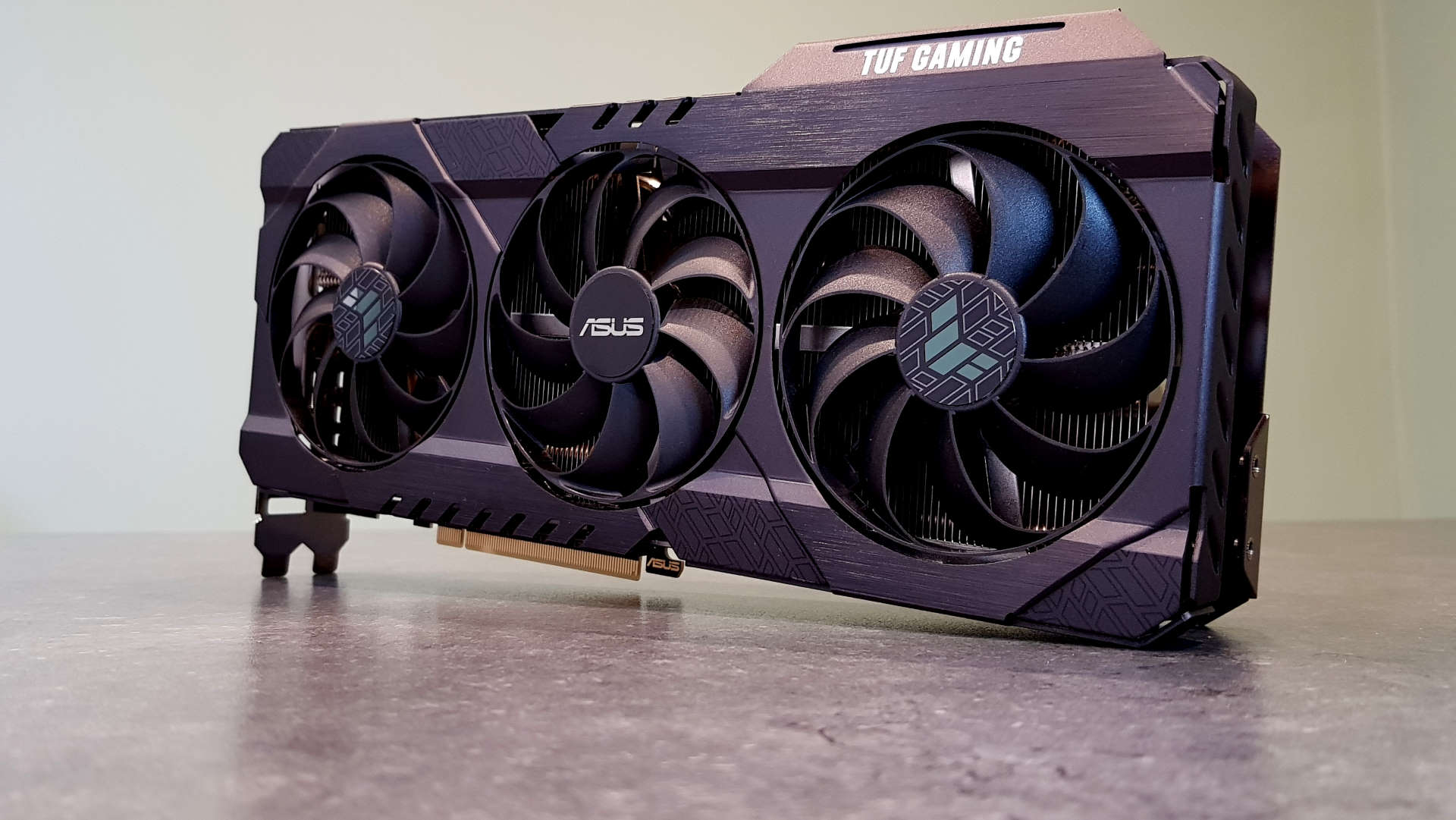Our Verdict
The RTX 3070 is a great gaming GPU, at both 1440p and 4K, but a factory overclocked card doesn't offer anything in Nvidia's Ampere generation.
For
- Excellent 1440p gaming performance
- Super-cool GPU
Against
- No tangible OC boost
- Higher power draw
- More expensive than FE card
PC Gamer's got your back
The new Nvidia RTX 3070 has now launched into the wild and, alongside the Founders Edition cards, the green team has also allowed third-party graphics card manufacturers to unleash their factory overclocked SKUs right from the get-go. And so we have the Asus TUF RTX 3070 OC, a slightly higher-clocked version of the third-tier Ampere GeForce card.
And it's quite the beefy sibling; sat next to the FE version of the more mainstream Nvidia GPU it is certainly a chunky looking card. But that's ever been the way with this RTX 30-series—the Founders Edition versions have all benefitted from Nvidia's own engineering efforts to shrink down the size of the PCB and create cards that don't necessarily bulk up to match the large GPUs at their hearts.
The same cannot be said for the third-party versions, where they're often far larger than the reference cards from Nvidia. That wasn't so apparent with the RTX 3080, however, as it was still a rather big boi, but the RTX 3070 is a more svelte wee thing. And quite lovely with it.
This Asus TUF RTX 3070, however, is every bit the chonk option, featuring the same GPU cooler as we've seen on the Asus TUF RTX 3080 OC card. That means we can expect some seriously impressive cooling performance, and given that this is the overclocked SKU, we might well need it.
Where the MSRP for the RTX 3070 is set by the Founders Edition GPUs, at $499 (£469), this Asus OC card is inevitably more expensive. With a UK price of £500 at select retailers, and a £550-odd standard price, we can expect the dollar value to come in around the same sort of $550 at best.
GPU - GA104
Lithography - Samsung 8nm
CUDA cores - 5,888
SMs - 46
RT Cores - 46
Tensor Cores - 184
OC Mode Boost clock - 1,845MHz
Gaming Mode Boost clock - 1,905MHz
Memory bus - 256-bit
Memory capacity - 8GB GDDR6
Memory speed - 14Gbps
Memory bandwidth - 448GB/s
In terms of the raw specifications, the Asus version of the RTX 3070 barely differs from the original Founders Edition, sporting the same GPU configurations of 5,888 CUDA cores thanks to the Ampere architecture's redesigned SMs delivering twice the potential floating point logic as its Turing-based forebears. We've gone into depth about the Turing architecture in our RTX 3080 FE review, so you can check out the full details there.
Alongside the GPU itself, you also get the same 8GB of GDDR6—not the GDDR6X that fills out the RTX 3080 and RTX 3090 cards—which is really the only place where the recently announced, and directly competing, AMD RX 6800 has any potential gains. The new Big Navi card has 16GB of GDDR6, with some fancy Infinity Cache feature to boost memory bandwidth, and promises performance a little higher than the RTX 2080 Ti.
In some circumstances. Those listed benchmarks from AMD do contain a little caveat about how that performance was achieved.
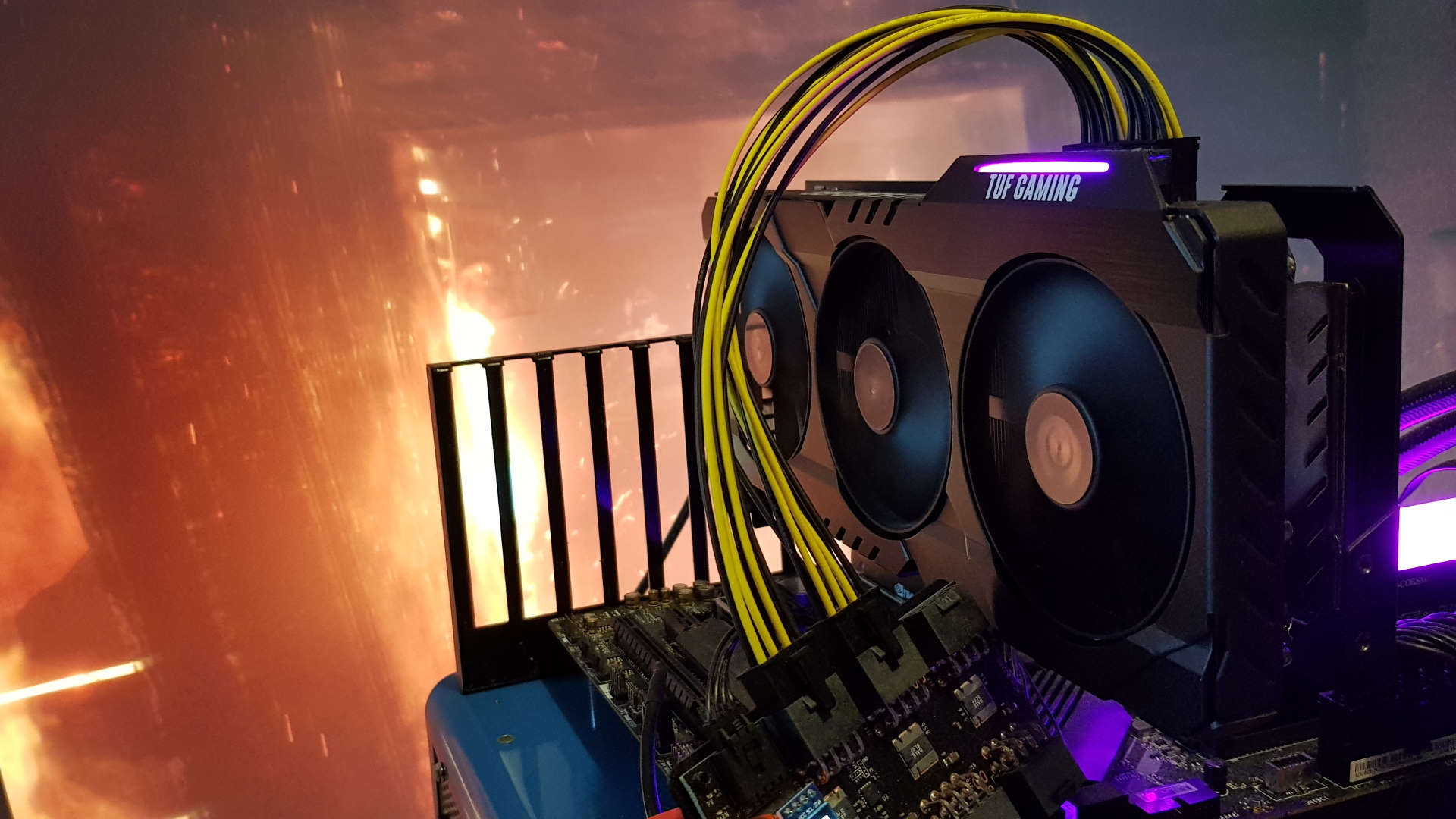

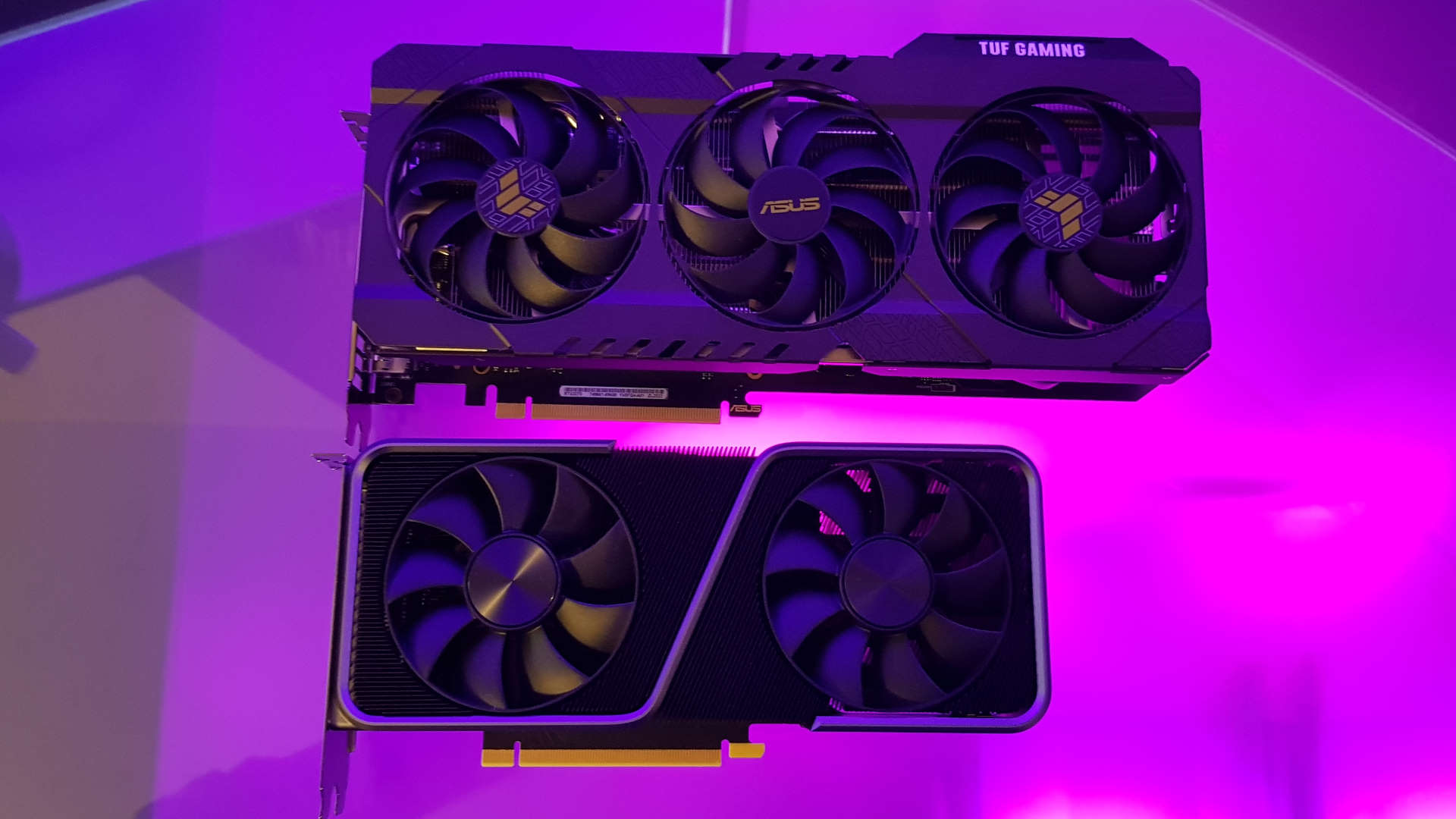
But I've not really experienced any problems with the VRAM size of either the RTX 3070 or RTX 3080, which both have less video memory than the new AMD cards launching in November. So, I'm still unconvinced about how big a sell that will really be for PC gamers.
The Asus TUF RTX 3070 OC, as the name implies, is a factory overclocked version of Nvidia's latest graphics card, and so the clock speed has changed, with Boost clocks on the different modes going up to 1,905MHz. In reality that doesn't equate to much, because the Founders Edition already goes way above its 1,725MHz Boost clock speed anyways. Realistically it feels like OC cards are losing relevance in today's market, especially GeForce cards.
In our own testing the Founders Edition averages out at 1,862MHz in gaming tests, while this Asus card comes in with a higher 1,901MHz on average. That's just another 39MHz on average on top of the Nvidia-built card with its reference clock, and inevitably doesn't really make a blind bit of difference in the overall gaming performance metrics.
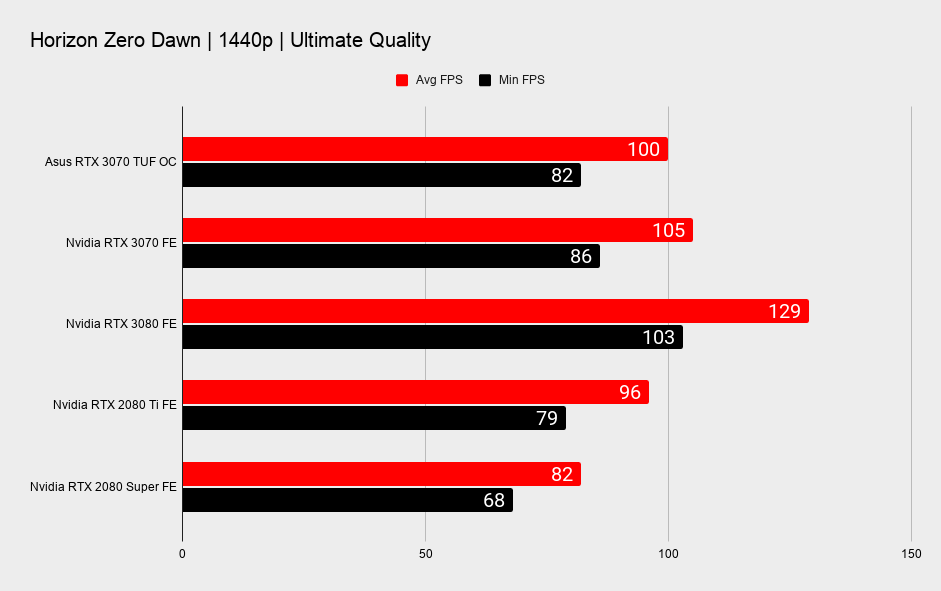
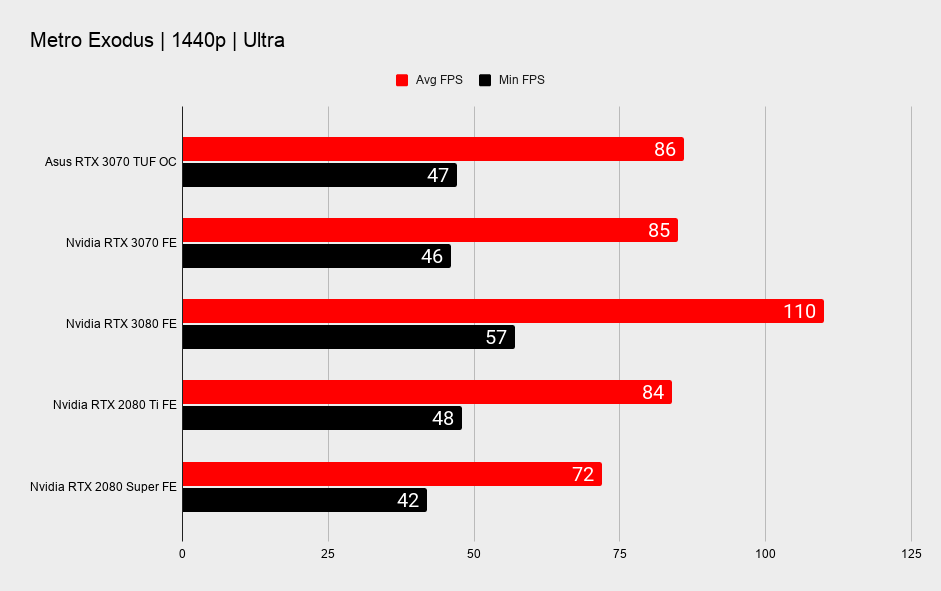
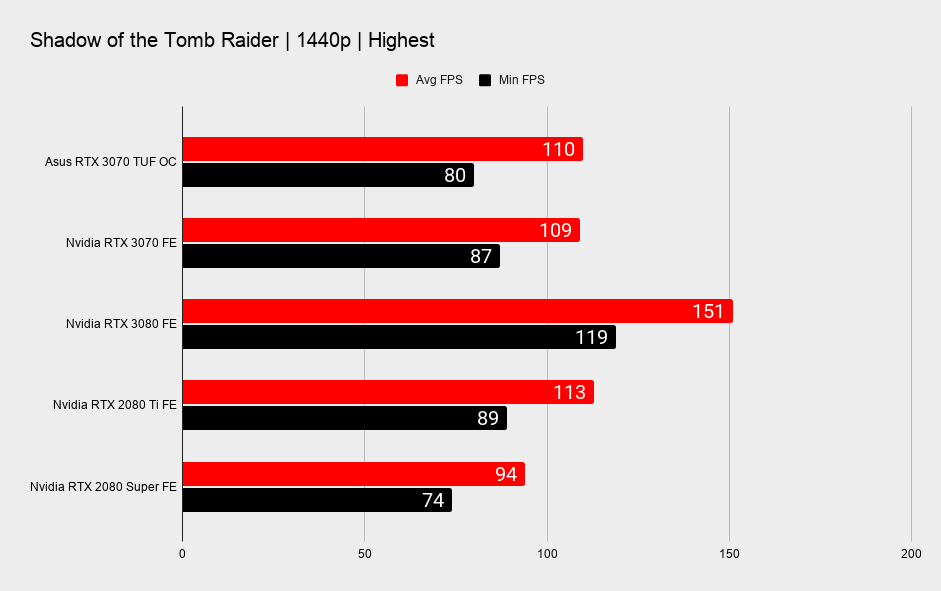
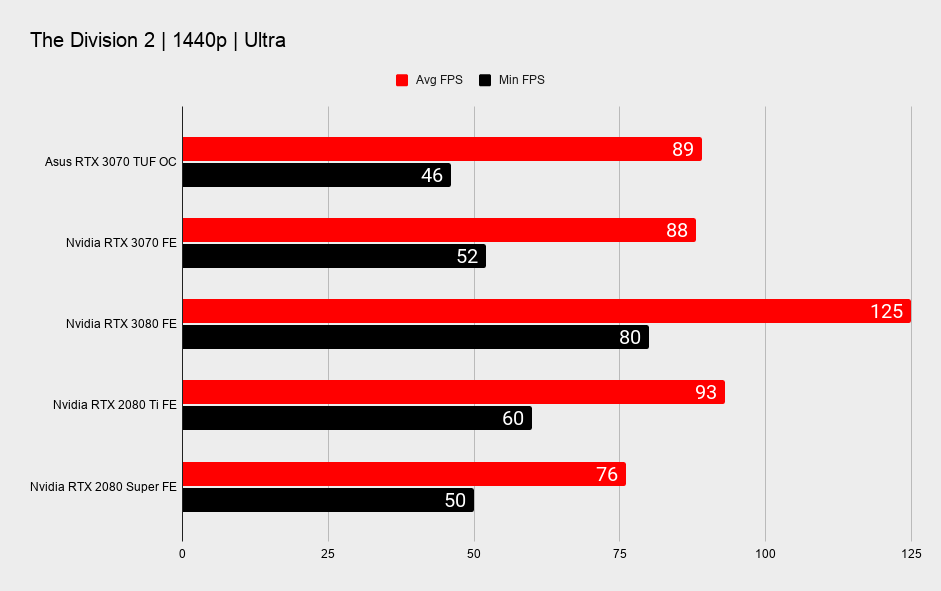
Which is to say that it is still a mighty impressive graphics card. The Asus GPU is still delivering gaming performance that is either just ahead of the RTX 2080 Ti—the $1,200 top Turing GPU from the last generation—or just behind it. But however it falls on a game-by-game basis the performance delta is always negligible.
At 1440p you're often getting into three figures for average frame rate performance, which makes this ~$500 card an outstanding gaming GPU. But given that it's trading blows with the RTX 2080 Ti that also makes the RTX 3070 a pretty impressive 4K card too.
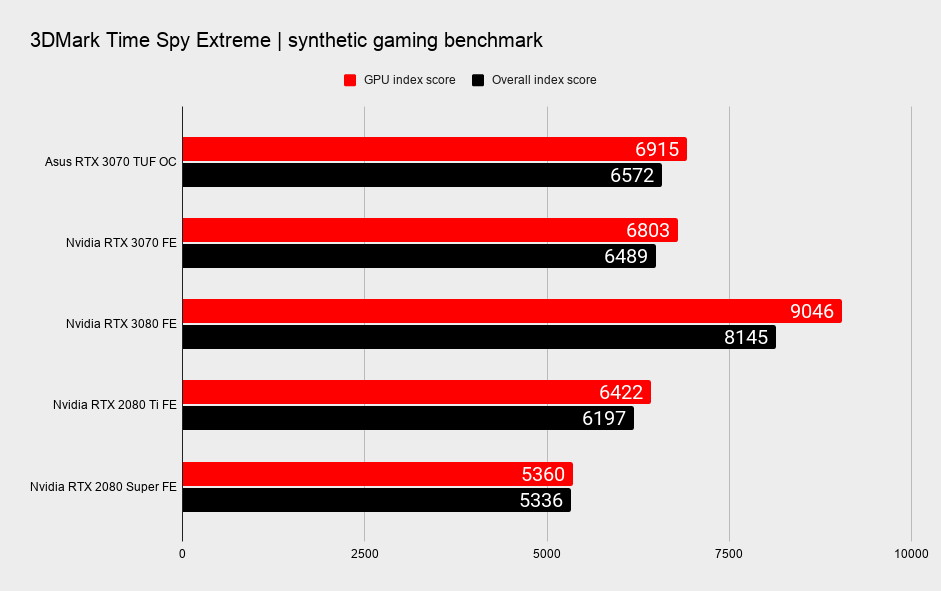
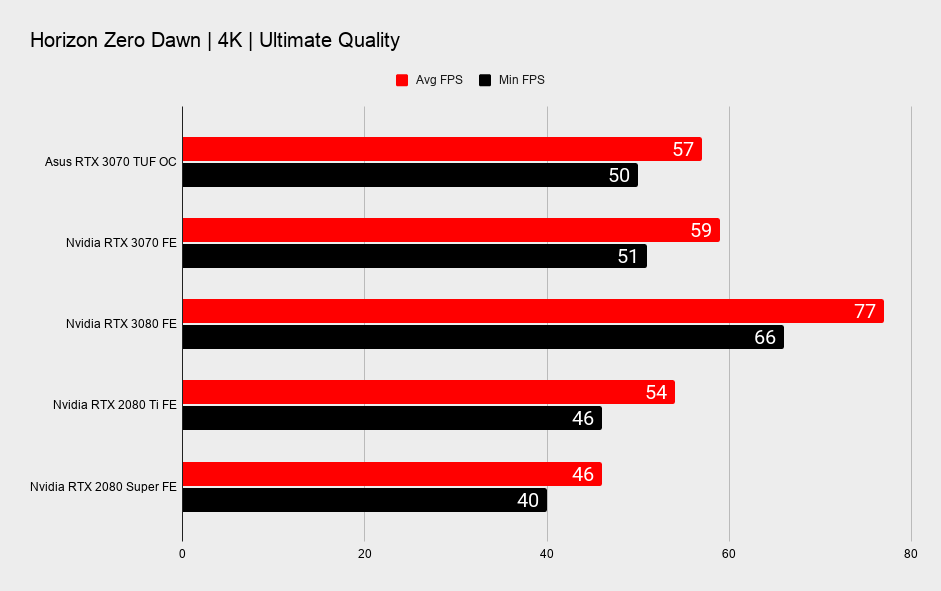
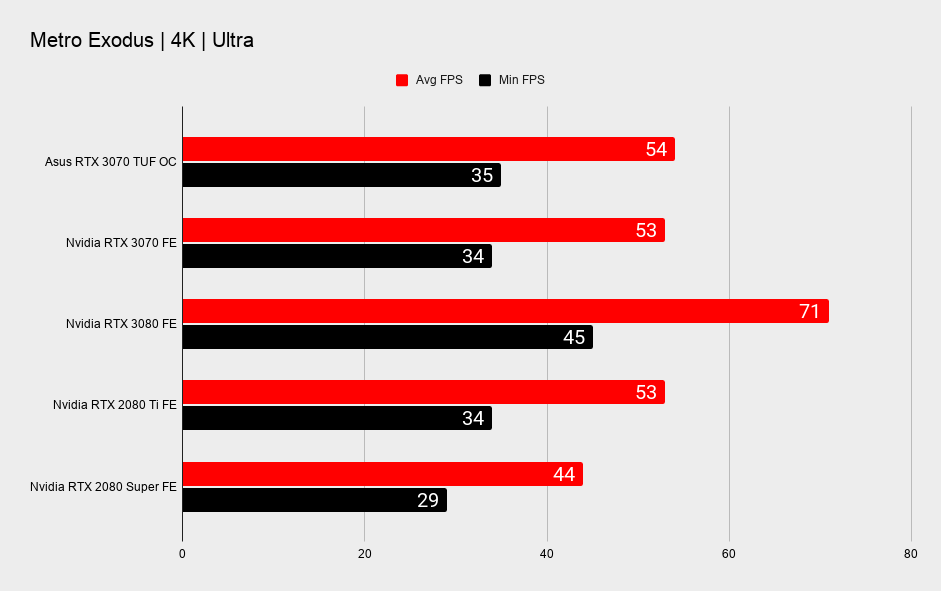
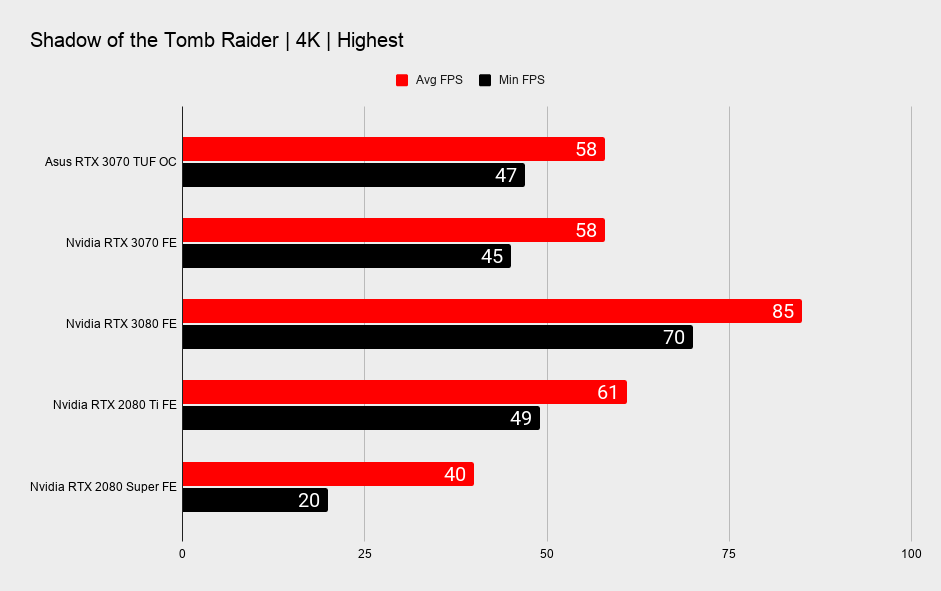
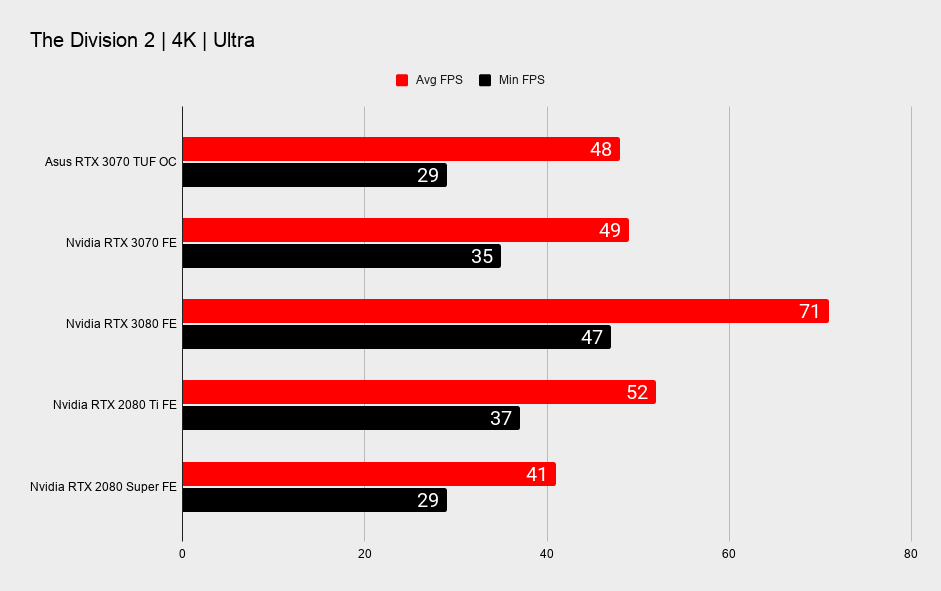
If you want to nail 60fps at 4K in every game you're going to need to adjust your desire to run at the absolute highest graphics settings, but those desires are only going to need a little pruning to get there.
Where it does regularly lag behind the RTX 2080 Ti, however, is in the ray traced performance. The top Turing GPU comes with a whole lot more dedicated RT silicon inside it, which makes it a more natural ray tracing chip. That said, you won't find a graphics card with this level of ray tracing performance, for this price anywhere.
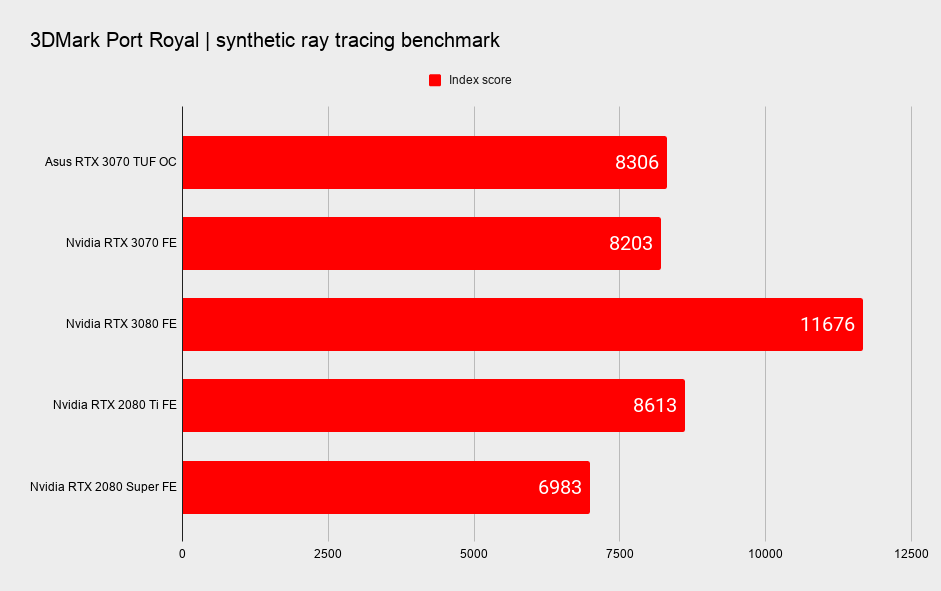
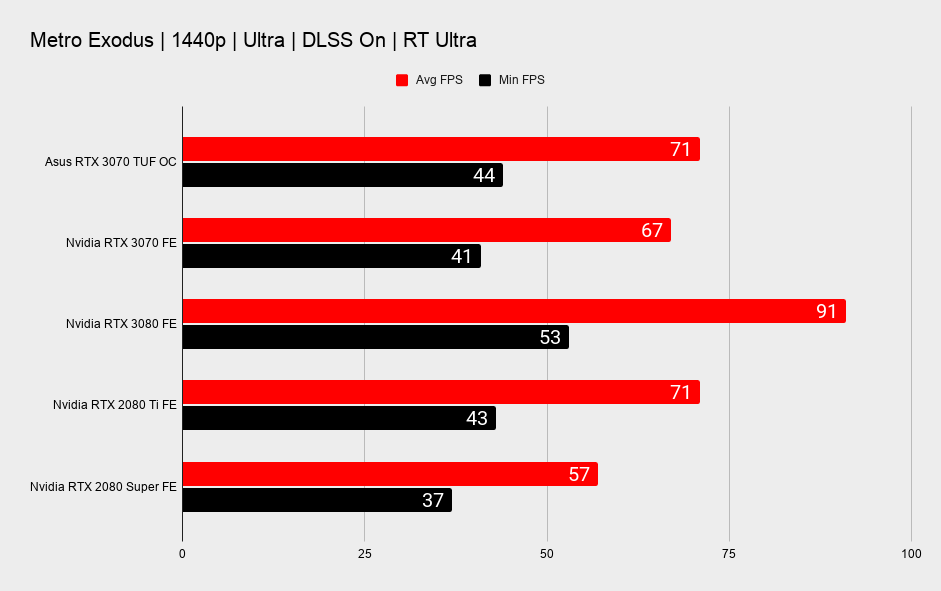
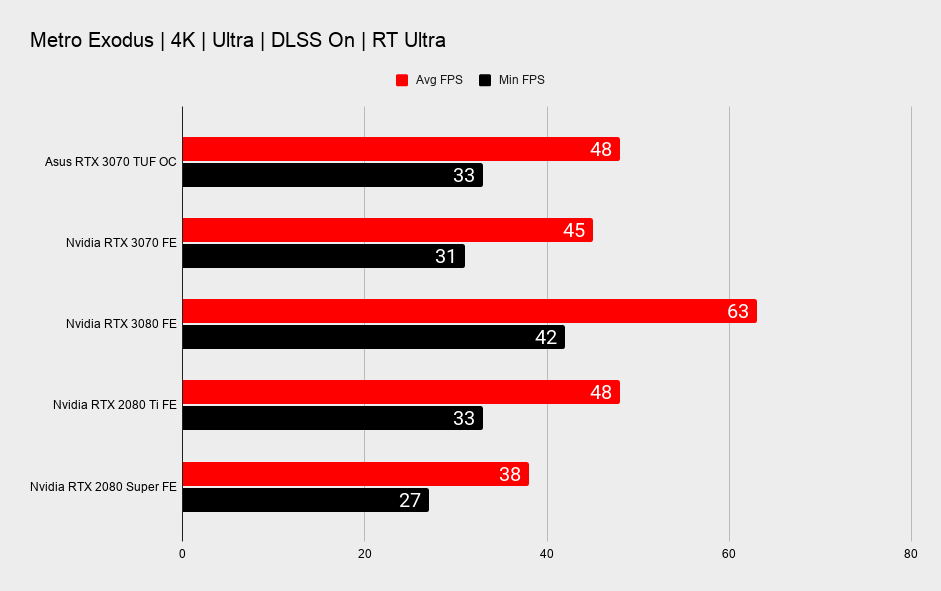
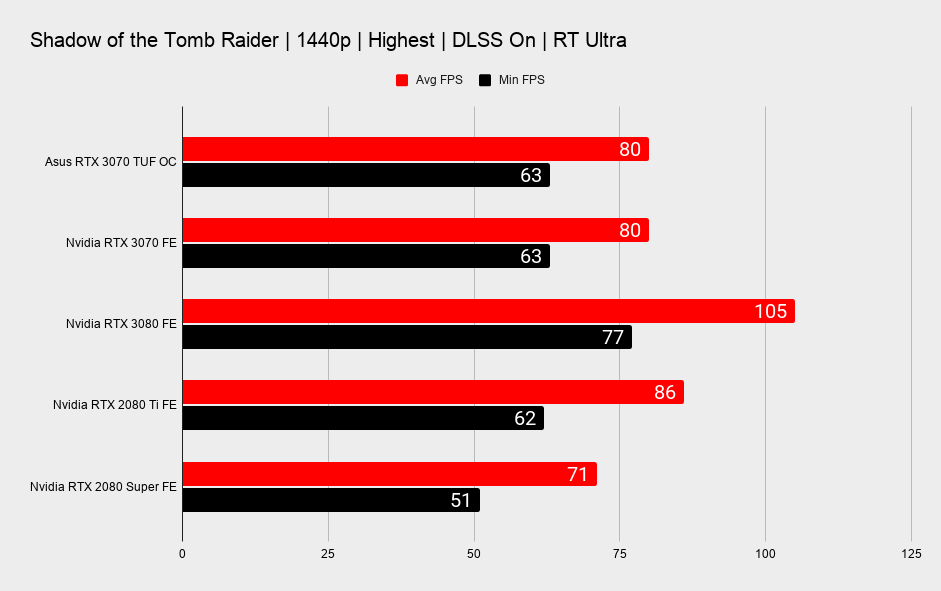
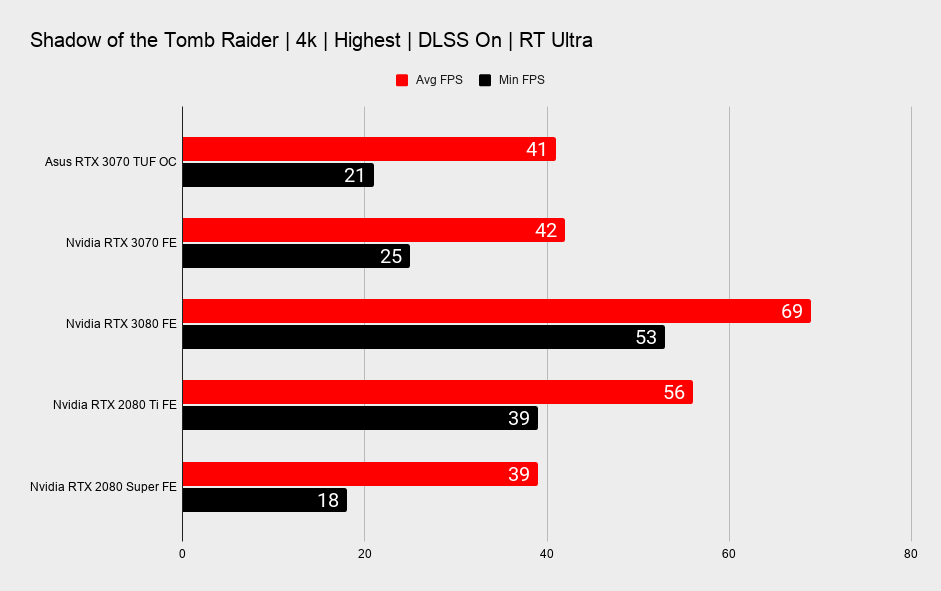
But if you were hoping for an overclocked GPU that could take the new Nvidia Ampere silicon further you will be disappointed. Even under Performance Mode—there is also a Quiet Mode switch on the Asus card's PCB—it's not consistently faster than our Founders Edition card. Sometimes it does deliver a few extra FPS, but it does also drop a few here and there too.
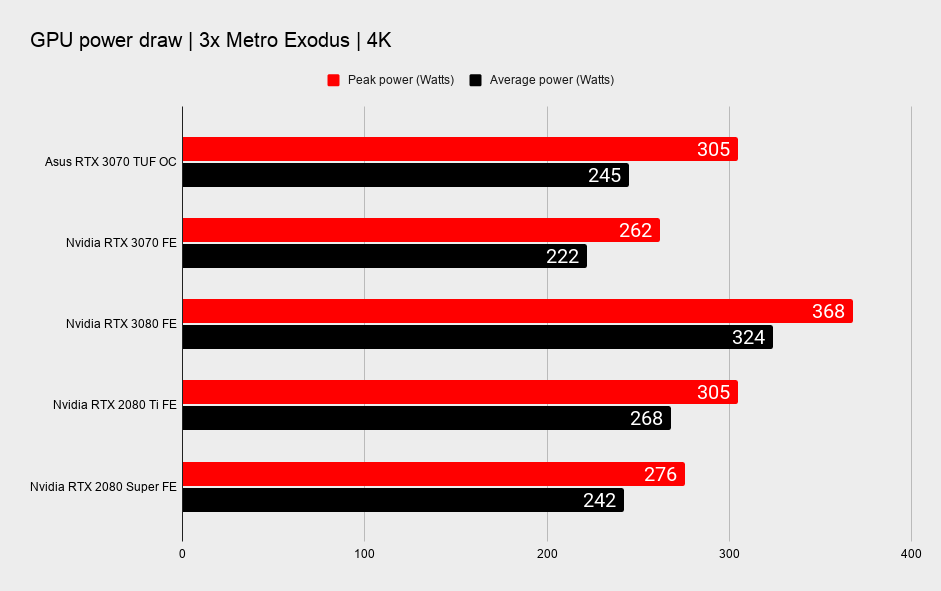
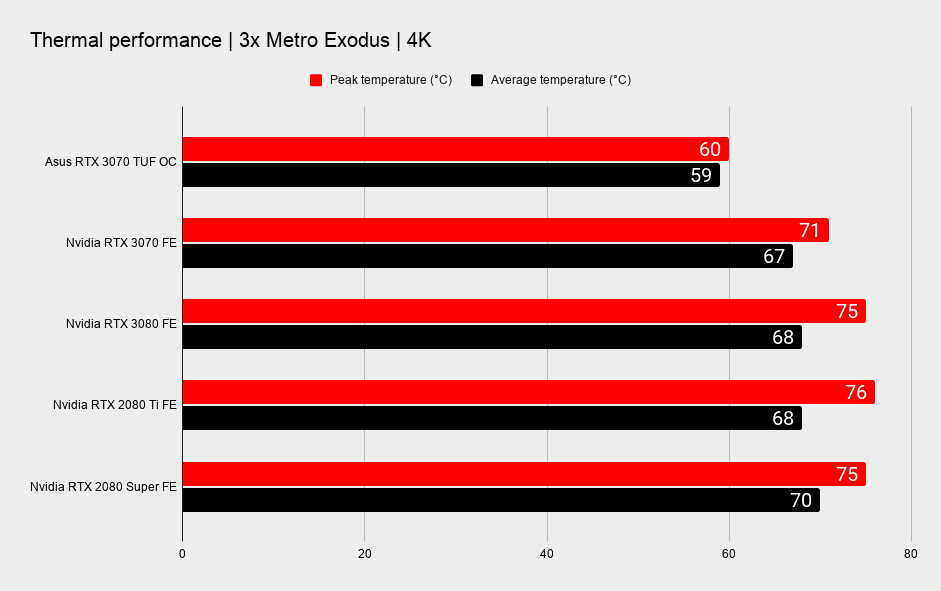
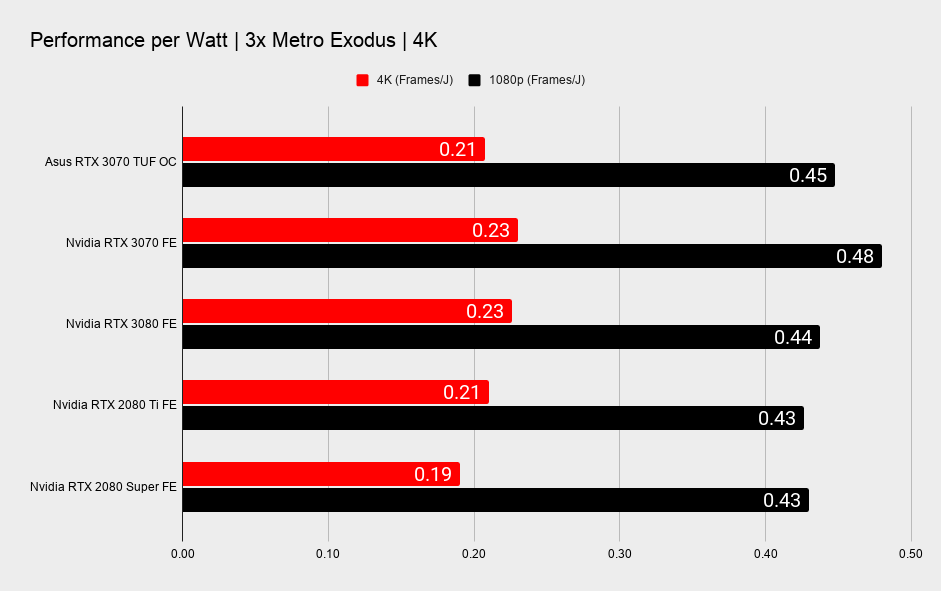
CPU - Intel Core i7 10700K
Motherboard - MSI MPG Z490 Gaming Carbon WiFi
RAM - Corsair Vengeance RGB Pro @ 3,200MHz
CPU cooler - Corsair H100i RGB Pro XT
PSU - NZXT 850W
Chassis - DimasTech Mini V2
It does also chew through a lot more power than the more-efficient Nvidia card, thanks to that desire for overclocking performance. With a peak power draw of over 300W it does ask a whole lot more of your PSU than the less-thirsty FE GPU. Though it is far cooler, to the tune of almost 10°C on average.
That's the benefit of Asus' beefy cooling solution, but it's the same one you'd find on the non-OC version of the TUF RTX 3070. And that makes it supremely tough to recommend this overclocked SKU instead.

Honestly, I feel like right now overclocking is over. Nvidia has told me it's just gotten better at getting the most out of its chips, so it can guarantee clock speeds almost at the limits of what the silicon can do for everyone. I certainly got nothing out of overclocking the RTX 3070 Founders Edition card in terms of a performance boost.
That means the silicon lottery could be a thing of the past, and to me it seems like that's where factory overclocked graphics cards belong now too. You're simply not getting anything more for your money, especially when it comes to cards such as the Asus TUF where you can still get the same great cooler on the cheaper non-OC cards.
So, in the end, the RTX 3070 is a really impressive graphics card in all its guises, mostly outperforming the ultra-enthusiast GPU of the previous generation and smashing the similarly more expensive RTX 2080 Super across the board too. But I'd suggest avoiding the price premium of overclocked cards… well, unless that's all that's left when the launch stock has been ravaged anyways.
The RTX 3070 is a great gaming GPU, at both 1440p and 4K, but a factory overclocked card doesn't offer anything in Nvidia's Ampere generation.

Dave has been gaming since the days of Zaxxon and Lady Bug on the Colecovision, and code books for the Commodore Vic 20 (Death Race 2000!). He built his first gaming PC at the tender age of 16, and finally finished bug-fixing the Cyrix-based system around a year later. When he dropped it out of the window. He first started writing for Official PlayStation Magazine and Xbox World many decades ago, then moved onto PC Format full-time, then PC Gamer, TechRadar, and T3 among others. Now he's back, writing about the nightmarish graphics card market, CPUs with more cores than sense, gaming laptops hotter than the sun, and SSDs more capacious than a Cybertruck.
